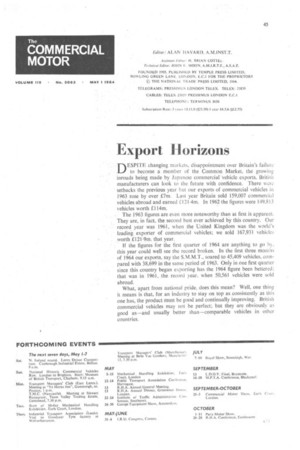Export Horizons
Page 47

If you've noticed an error in this article please click here to report it so we can fix it.
DESPITE changing markets, disappointment over Britain's failure to become a member of the Common Market, the growing inroadsbeing made by Japanese commercial'vehicle exports, British manufacturers can look to the future with confidence. There were setbacks the previous year hut our exports of commercial vehicles in 1963 'rose by over £7m. Last year Britain sold 159,007 commercial vehicles. abroad and earned €121.4m. In 1962 the figures were 149,813 vehicles worth £114m.
The 1963 figures are even more noteworthy than at first is apparent. They are, in fact, the second best ever achieved by this country. Our redord year was 1961, when the United Kingdom was the world's leading. exporter of commercial vehicles; we sold 167,931 vehicles worth £121-9m. that year.
If the figures for the first quarter of 1964 are anything to go by. this year could well see the record broken. In the first three months of 1964 our exports, say the S.M.M.T., soared to 45,409 vehicles, compared with 38,699 in the same period of 1963. Only in one first quarter since this country began exporting has the 1964 figure been bettered: that was in 1961, the record year, when 50,561 vehicles were sold abroad.
What, apart from national pride, does this mean?. Well, one thing it means is that, for an industry to stay on top as consistently as this one has, the product must be good and continually improving. British commercial vehicles may not be perfect; but they are obviously as good as—and usually better than—comparable vehicles in other countries.




















































































































































































































































